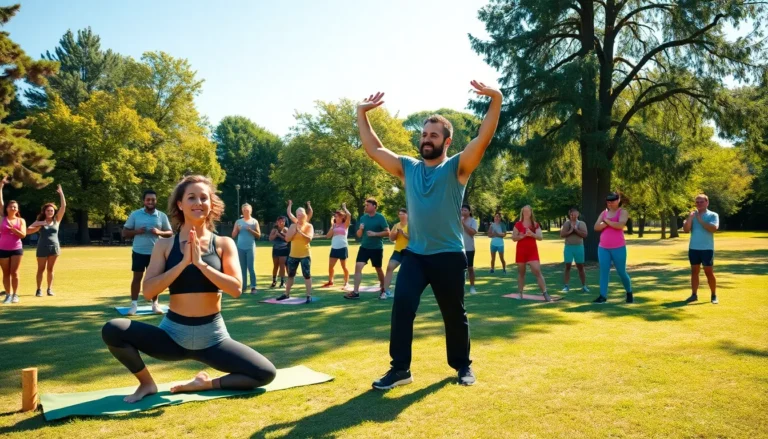Table of Contents
ToggleEmbarking on a personal fitness journey is like signing up for a rollercoaster ride—full of ups, downs, and the occasional loop-de-loop. It’s not just about shedding pounds or fitting into those jeans from college; it’s about discovering resilience, strength, and maybe a few new dance moves in the process.
Understanding Your Personal Fitness Journey
Personal fitness journeys encompass a range of emotional and physical experiences. They involve discovering resilience and strength while also exploring new skills along the way.
Defining Personal Fitness
Personal fitness involves more than just physical appearance. It includes overall health, mental well-being, and the ability to perform daily activities efficiently. Understanding personal fitness requires recognizing individual capabilities and limits. Each person’s journey varies, shaped by unique goals and lifestyles. Evaluating fitness isn’t confined to numbers; it encompasses energy levels, endurance, and personal satisfaction with physical activity.
Importance of Setting Goals
Setting goals plays a crucial role in personal fitness journeys. Goals provide direction and motivation, making it easier to track progress. Short-term goals, like completing a certain number of workouts per week, create immediate achievements. Long-term goals focus on significant milestones, such as running a marathon or achieving a target weight. Tailoring goals to individual needs enhances commitment and accountability. Effective goal-setting fosters a sense of purpose and accomplishment, motivating ongoing effort and dedication.
Stages of a Personal Fitness Journey

Personal fitness journeys typically unfold through four key stages. Each stage involves specific actions and reflections that contribute to an individual’s overall success.
Assessment Phase
The assessment phase focuses on understanding one’s current fitness level, strengths, and areas for improvement. Individuals often perform various fitness tests to gauge endurance, strength, and flexibility. Recognizing current health concerns alongside fitness levels is essential. Setting clear benchmarks fosters an accurate assessment. Recording these findings creates a reference point for future progress.
Planning Phase
During the planning phase, individuals outline their fitness goals and craft a detailed plan. It includes selecting suitable workouts, nutrition strategies, and recovery timelines. Prioritizing both short-term and long-term objectives enhances motivation. Incorporating personal interests into workout plans promotes consistency. Setting realistic timelines ensures that individuals remain engaged and accountable throughout their journey.
Execution Phase
With a plan in place, the execution phase commences. Adopting a regular workout schedule and adhering to nutritional guidelines become priorities. Overcoming challenges is essential during this stage, as fatigue and motivation fluctuations can occur. Staying adaptable enables individuals to modify routines without losing sight of goals. Celebrating small victories throughout this phase reinforces commitment and provides immediate satisfaction.
Reflection Phase
The reflection phase allows individuals to evaluate their journey and acknowledge progress. Assessing achievements, challenges, and emotional growth contributes to long-term success. Adjusting goals based on experiences enables continuous improvement. Gathering feedback and documenting changes in physical and mental health brings new insights. This crucial phase encourages ongoing motivation and adaptation to maintain a fulfilling fitness journey.
Overcoming Challenges in Your Fitness Journey
Embarking on a fitness journey entails addressing various challenges. Understanding these obstacles prepares individuals to navigate their paths more effectively.
Common Obstacles
Time constraints frequently hinder consistent training. Many struggle to fit workouts into busy schedules, making prioritization essential. Lack of motivation also presents a challenge; engaging with a supportive community can provide encouragement. Injuries may disrupt progress, emphasizing the importance of proper form and recovery. Dietary choices often act as significant roadblocks. Individuals might find it difficult to resist unhealthy foods despite their fitness goals, necessitating a focus on balanced nutrition.
Strategies for Success
Setting realistic goals significantly enhances success. SMART goals—Specific, Measurable, Achievable, Relevant, Time-bound—clarify objectives and track progress effectively. Establishing a consistent workout routine motivates adherence over time. Sharing fitness ambitions with a friend or family member fosters accountability, creating a sense of partnership in the journey. Incorporating varied workouts prevents boredom and keeps individuals engaged. Seeking professional guidance from trainers or nutritionists provides tailored advice for unique needs, streamlining the journey towards overall wellness.
The Role of Nutrition
Nutrition plays a crucial role in any personal fitness journey. It fuels the body, supports recovery, and enhances overall health.
Fueling Your Body
Providing the right nutrients ensures optimal performance during workouts. Carbohydrates supply energy for intense activities while proteins help in muscle repair and growth. Healthy fats are essential for hormone regulation and overall cellular function. Micronutrients like vitamins and minerals strengthen the immune system and assist in recovery. Choosing whole, unprocessed foods often results in better energy levels and improved performance. Hydration also contributes significantly; water aids in digestion, regulates temperature, and maintains performance. Prioritizing balanced meals can make a notable difference in fitness progress.
Meal Planning Tips
Meal planning streamlines healthy eating and supports fitness goals. Start by designing a weekly menu that includes a variety of foods, emphasizing protein, whole grains, fruits, and vegetables. Preparing meals in advance helps avoid unhealthy last-minute choices. It’s beneficial to batch-cook lean proteins or chop vegetables to save time during the week. Always keep healthy snacks available to curb hunger between meals. Labeling portions makes it easier to stay on track. Assessing personal dietary needs ensures that meal choices align with fitness objectives. Staying flexible allows for adjustments based on lifestyle changes or specific goals.
Celebrating Milestones
Recognizing milestones during a personal fitness journey adds motivation and encourages continued progress. Tracking progress becomes essential for celebrating achievements.
Tracking Progress
Individuals benefit from monitoring their advancements. Regularly logging workouts and dietary intake provides clarity on the journey. Fitness apps or journals can ease this process, offering visual affirmations of improvement. Assessing personal records, such as lift weights or running times, shows tangible results. Monthly check-ins help refine goals based on growth or setbacks. Adjustments stem from understanding what strategies yield the best outcomes. This continuous evaluation fosters a sense of accomplishment and fuels future aspirations.
Reward Systems
Implementing reward systems enhances commitment to fitness goals. Celebrating small victories helps maintain motivation. Simple rewards might include a new workout outfit or a massage after reaching a particular benchmark. Structuring rewards around personal values increases their effectiveness. Enjoying a favorite healthy meal or scheduling a spa day can also serve as incentives. Associating rewards with milestones reinforces positive behavior and encourages accountability. Finding joy in the journey through these rewards ensures continued enthusiasm for fitness endeavors.
A personal fitness journey is a transformative experience that goes beyond physical appearance. It’s about building resilience and discovering one’s true potential. Each phase of the journey—from assessment to reflection—offers valuable lessons that contribute to overall well-being.
As individuals navigate their unique paths they’ll encounter challenges and triumphs that shape their commitment to fitness. Embracing these moments fosters growth and keeps motivation high.
By setting realistic goals and celebrating milestones along the way, anyone can enhance their journey and maintain enthusiasm. Ultimately, personal fitness is a lifelong endeavor that enriches both the body and mind, leading to a healthier and more fulfilling life.







